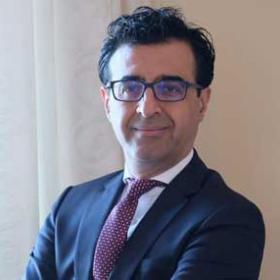
Hassan Talks Al-Kadhimi Cabinet and ISIS "Resurgence" with Indus News
On May 7, EWI's Vice President of the Middle East and North Africa program Kawa Hassan participated in a panel interview with the Pakistani TV Station Indus News program Scope with Waqar Rizvi. The other panelist was Mohammed Hussein, policy director at the Iraqi Center for Policy Analysis & Research (ICPAR).
Click here to watch the interview. Hassan's comments begin at 17:09. Read a paraphrased summary of his remarks, below.
Finally, there is a new government in Iraq and that is good news. Whether Al-Kadhimi will be able to solve all the problems Iraq is facing is a big question mark. This is a provisional government—probably for one or two years. Al-Kadhimi said his aim is to prepare the ground for an early, free and fair election, ensure Iraq is not a theater for proxy wars between Iran and the U.S., that the Iraqi state has a monopoly of violence and that all militias will be under the control of the state. There is a good opportunity for Al-Kadhimi to achieve the last aim by gradually bringing militias under state authority, since there is consensus and support among the key Iraqi players. More importantly, Iraq’s lack of a strong state, which controls the means of violence, is one of the reasons for the nation’s current instability. It is a big question whether he [Al-Kadhimi] will succeed in bringing to justice those [officials, leaders] who were responsible for the killing of demonstrators and address the corruption of the ruling establishment.
Recent ISIS attacks are alarming and worrying. The terrorist organization was weakened in 2018 and 2019, but now, it made a comeback [in rural areas] because of the fragile state of Iraqi institutions, the fragmentation of the political scene and the lack of a national plan for the resettlement of internally displaced persons (IDPs) and reconstruction of liberated areas. The fact that ISIS is “resurging” [in rural areas] means that the political establishment failed to learn lessons from the previous expansion of the terrorist organization [in 2014].
The problem of the corruption of the ruling elite is as strong and destructive as ever. Yes, there has been some progress in terms of the resettlement of the IDPs—so far, 4.6 million IDPs have been resettled. But there are still almost 1.4 million IDPs that remain. IDP camps are an excellent place for the expansion of the sectarian and destructive ideology of ISIS—in a way, these camps could be the ideal "university" for the "graduation" of [future] ISIS militants because of a lack of national consensus and strategy on how to reconstruct the liberated areas, lack of proper coordination between the different intelligence and security services responsible for preserving security in those areas and, more importantly, lack of a security structure trusted by the local population.
There is a new dynamic [with respect to the proxy conflict between Iran and the U.S.]. At the moment, Iran is preoccupied with dealing with the COVID-19 pandemic. Iran is still trying to fill the void left by the killing of General Qasem Soleimani and Abu Mahdi Al-Muhandis. Soleimani had enormous influence and relations with key political players across the board. At the same time, the U.S. administration is preoccupied with addressing the spread of coronavirus in the U.S.; also, you hear in certain conservative circles in Washington that there is an Iraq fatigue—that we have been helping Iraqis for the last seventeen years, but look at the situation today, where powerful pro-Iran groups [have gained influence]. As a result, there is a space for the new Iraqi government to take initiative and try to build balanced relations with these two powers—these two key players have two different strategic aims when it comes to Iraq and how they view security and stability in the country.
Collapsing oil prices have a destructive impact on Iraq's economy. It is worrying that there is less and less international interest in fighting ISIS and to help Iraq economically, partly, because of Iraq's structural problems and the corruption of the ruling elite that came to power in 2003.

